
 |
||||
|---|---|---|---|---|
| Volume 49 Number 22, November 30, 2019 | ARCHIVE | HOME | JBCENTRE | SUBSCRIBE |
General Election:
Workers' Weekly Internet Edition: Article Index : ShareThis
General Election: Boris Johnson's Nonsense about Representing the People vs Parliament
General Election:
The Call for Real ChangeNo to NATO:
Britain Out of NATO! Dismantle NATO!
Calling NATO a "Unique Diplomatic Force Multiplier"
Aggressive War Alliance and United Nations Discuss "Enhancing Practical Co-operation"
US Primes NATO to Confront Russia, China
General Election:

Large demonstration against the government in Parliament
Square, September 9 2019
In calling this General Election, Boris Johnson declared that the problem facing the British people is that they are not represented by the Parliament. This is in fact true. According to the logic which underlies the British parliamentary tradition, the election of members of parliament makes them representatives of the person of state, the Queen of England. The person of state rules over the people. In other words, the democracy is divided between those who govern and those who are governed. The role of the citizen is merely to put an "X" on a ballot during an election to indicate that they authorise someone else over whom they exercise no control to speak in their name.
But, of course, this is not the problem Boris Johnson is addressing when he declares that this election is about "the people versus Parliament". Far from proposing how the people can be vested with the decision-making power in such a manner that they can speak for themselves, he claims that Theresa May's coalition with the DUP and then his own minority government were "firmly on the side of the people". The very suggestion that his government's use of prerogative powers to get rid of dissenting voices represents "the people" is too ridiculous to deserve comment. Everyone knows that a Boris Johnson government is in the service of the wealthy and that it is incapable of sorting out the contradictions within the ranks of the wealthy to get their cake and eat it too. It has nothing whatsoever to do with the needs of a British economy that serves the British people.
But Boris Johnson's assertion that his government represents the people is not only untrue; it makes a mockery of what the parliamentary relationships are supposed to be. The government is understood to be in a relationship with the whole parliament and the whole parliament is where the decisions are presumed to be taken based on the claim that the House of Commons is its main component. The Parliament is an ensemble - all its parts taken together in which each part is considered only in relation to the whole. To pit one component of the relationship against another serves what purpose, does Mr Johnson suppose?
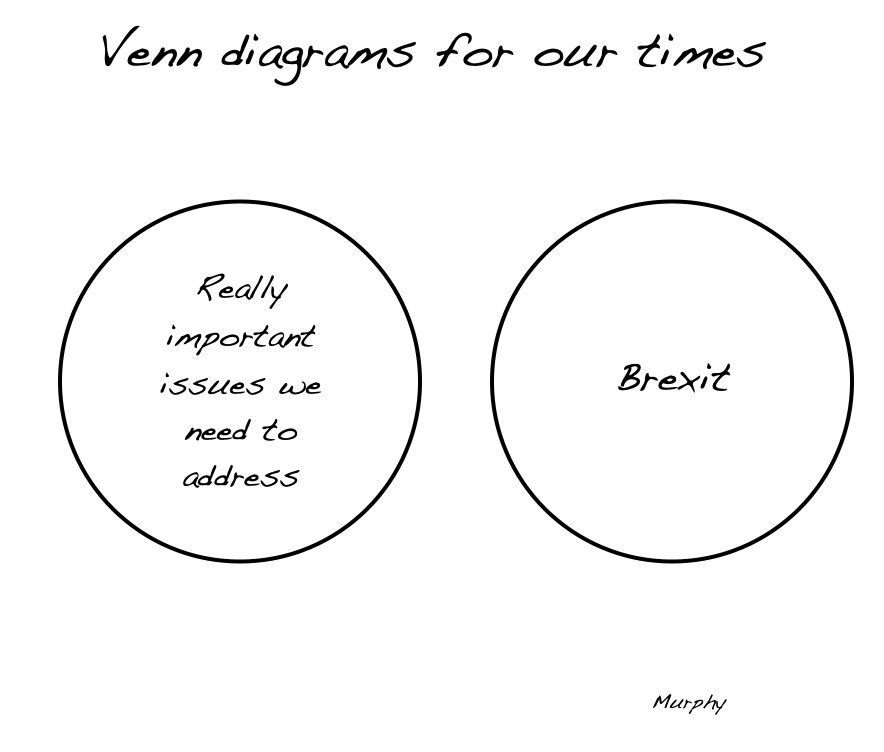
How is it that the government claims to be separate from the Parliament which is said to represent "the Commons"? Is the government not supposed to be an integral part of "the Commons"? Clearly, Mr Johnson is speaking nonsense. He is not coherent, which is par for the course. But his admission that the House of Commons does indeed exclude the "common people" also reveals the truth of the matter - the government is not governing with the consent of the governed. This is a serious problem which requires first-rate attention. Imagine the current Parliament as a musical ensemble. Far from being in harmony, most instruments are literally at war with one another. The sounds coming out of it are so harsh, dissonant and cacophonous that nobody wants to hear them.
Of course, the fact that the parliament is an ensemble and must be considered as such does not mean we support the existing ensemble. In no way does it address the serious problems facing the polity at this time. Furthermore, despite the disharmony and discord, the media pundits and cartel parties present it as "normal", as something the people have to put up with. Far from activating the people to take control of the situation, everything is done to distract attention from the real problems people face and providing them with viable solutions. The future is made to look very bleak, which is what happens when the political imagination is not directed at what is taking place in the present.
So long as what are called the democratic institutions are not on a par with the requirements of the conditions today, the needs of the people and the serious problems they and the society face will increase. The fundamental question of whom this democracy represents will continue to block any way out of the impasse which exists today because the role of the people is reduced to that of being spectators and authorising others to speak in their name. The call for change must be directed towards change in this relationship between people and Parliament.

The striving of the people is indeed for real change, as the Labour Manifesto proclaims. However, how does the issue of bringing about real change pose itself when the conditions call for real change but the people continue to be divided between this and that faction of the ruling class vying for power? So long as this is the case, the real change the people desire will remain undefined and elusive.
The desire of Britain's working people is to have a labour party which is not part of the status quo. This requires blocking the factions within the Labour Party itself and others that support a neo-liberal agenda and the status quo of power and privilege, which is what the Parliament represents today. It is the pay-the-rich agenda from which the factions seek to benefit that has caused havoc in the British economy in this period. The ruling class has privatised the systems of health care, education and civil services, as well as transportation, and turned other sectors of the economy over to war production and the oligopolies which are marauding over all countries of the world to make Britain, or the US or some other big power, great again.
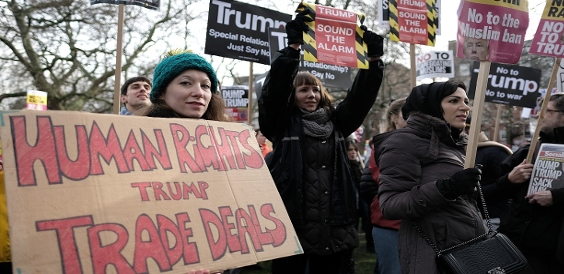
The change the conditions call for requires the replacement of the current forms used to keep the people outside of the decision-making power. This should begin with defeating Boris Johnson and his cabal and making it very clear to whosoever forms the next government that the people condemn factional fighting within the parties and between the parties.
In this election, prevent the Conservatives from forming a government, on their own or in alliance with the DUP, or in a coalition with any other party. Also, those in a position to do so, go all out to defeat the DUP and fight for a new coherence. Let us use the election to go all out to break the impasse by not permitting the status quo of factions fighting with one another to continue. This self-serving fighting is the sure sign that these factions do not represent the interests of the people. Reject these factions! That is the first step in the fight for real change, a change which has a broad perspective for the benefit of the whole of society.

On December 3 and 4, the North Atlantic Treaty Organisation (NATO) will mark its 70th anniversary with a Heads of State Summit in London. The anti-war movement and peace-loving people condemn this international alliance, a Cold War relic which is based on aggression and domination, and the holding of the summit in this country celebrating NATO at 70.
NATO has been called an "American invention designed to impose American power on Europe", and is increasingly threatening those countries whose interests run counter to those of the US and its allies, a force for aggression and destabilisation world-wide. Certainly this present summit of the 29 NATO members, with Donald Trump, Boris Johnson and Recep Tayyip Erdogan set to attend, promises no good whatsoever for the people.
NATO, in short, is an aggressive and expansionist nuclear and military alliance, playing a very dangerous global role. It is expanding further into Eastern Europe, with bases intended to encircle Russia which it paints as the enemy, as well as the Middle East and Latin America, and is still in Afghanistan after 18 years. The working class and people demand peaceful relations between countries and peoples, and oppose NATO's war plans. Rather than funds from the Treasury going to war production and its destruction of value, investments must go towards strengthening the British economy to serve the needs of the people of Britain.

It also boggles the mind that this meeting of heads of state and others is taking place, with all its security implication, in the midst of a general election campaign. The dysfunctional governments of Boris Johnson and Theresa May before him have shown how incapable they are of ensuring the people's safety.
The anti-war movement and such organisations as the Stop the War Coalition and the Campaign for Nuclear Disarmament are stepping up their work, and are organising actions in opposition to the summit with its agenda of warmongering and interventionism, of regime change and nuclear blackmail.
In advance of the protests being organised around the Queen's reception for NATO leaders on December 3, Stop the War and CND have hosted an international counter-summit in central London on November 30, "No to Trump - No to NATO". The event is bringing together anti-war voices from across Europe and beyond, to discuss NATO's nuclear warmongering, its interventionist wars, and set out how civil society can work to abolish NATO and create a more peaceful world.
This is a decisive time for the anti-war movement and the movement to bring about an Anti-War Government. We call on everyone who cherishes peace to take a stand against NATO.
Dismantle NATO! Stop the Warmongering!
Build the Movement for Peace and to Bring about an Anti-War Government!
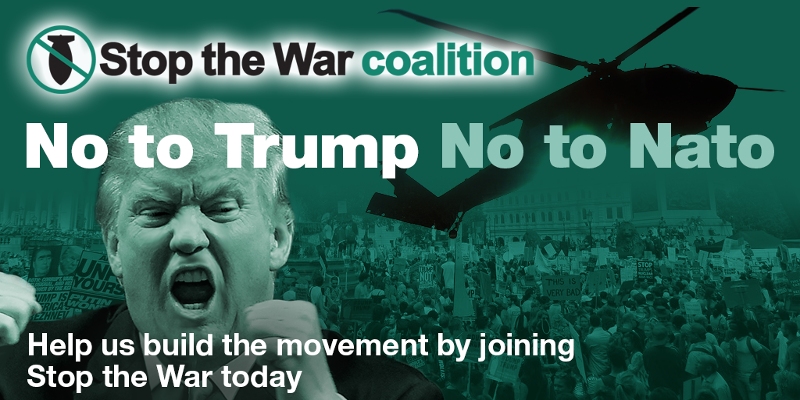
Plans have been confirmed for this coming Tuesday's
demonstration against Donald Trump and the NATO summit:
4pm: Assemble on south of Trafalgar Sq. for speeches & music
5pm: March leaves Trafalgar Sq. to Buckingham Palace via The Mall
5.45pm: Arrives at Canada Gate opp. Buckingham Palace
6pm: NATO reception begins
7pm: R3 Soundsystem - Dance Music Against Trump at Buckingham Gate
The organisers are encouraging everyone to bring glow sticks and fairy lights, etc., for visibility as well as horns, whistles, pots, pans and other instruments to make as much noise as possible at the protest.
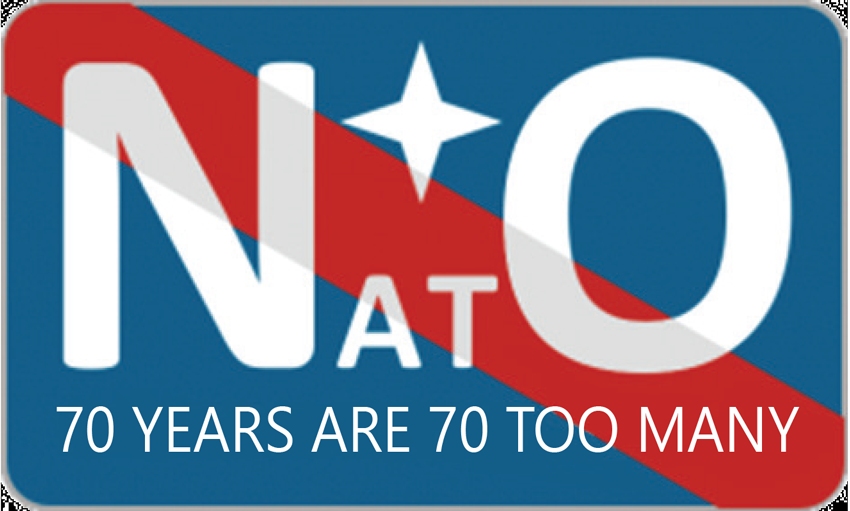
NATO Secretary General Jens Stoltenberg accepted Foreign Policy magazine's "Diplomat of the Year" award at a ceremony in Washington, DC, on November 12. In accepting the award from editor-in-chief Jonathan Tepperman, Stoltenberg made a case for "relentless transatlantic diplomacy, backed by credible transatlantic defence". He called NATO "a unique diplomatic 'force multiplier'", and claimed that "when 29 nations speak with one voice, their voice is more powerful than any other in the world".
In his acceptance speech, Stoltenberg spoke at length to justify NATO's war preparations, claiming military threats to NATO countries where none exist. He highlighted NATO's aggressive encirclement of Russia with its massive military build-up in eastern Europe: "[O]ur diplomatic efforts can only be effective if we engage Russia from a position of credible deterrence and credible defence." He went on to suggest that China poses a similar threat to NATO countries: "Diplomacy combined with military strength is also important as we adapt to a shifting global balance of power. A key driver for this is China. China will soon have the world's biggest economy. And it already has the second largest defence budget, investing heavily in new capabilities." Although China has not been invading other countries and carrying out coups and regime change, it is said to pose a threat to NATO countries. Stoltenberg's so-called diplomacy is simply window dressing to cover up outright aggression that serves the interests of NATO countries, especially the big powers.
As concerns his assertion that NATO represents "29 nations speak[ing] with one voice [that is] more powerful than any other in the world", this does not reflect reality. A major split currently exists in NATO, between the US and the other members, as the Trump administration considers NATO to be ineffectual and a hindrance to US aims because it does not function without the US military and funding. Moreover, 29 countries out of the nearly 200 in the world is a small minority compared to other international groupings, such as the Group of 77 or the Non-Aligned Movement. Furthermore, whereas the Group of 77 and the Non-Aligned Movement operate within the bounds of the United Nations and the rule of international law, NATO does not. It is a rogue military alliance that flouts the rule of international law. Its aggressive activities are opposed by a majority of the world's peoples, who decry it as the "North Atlantic Terrorist Organisation". Counter to Stoltenberg's sophistic remarks, reality indicates that NATO serves narrow aggressive aims and imposes itself on others according to the imperialist doctrine of "Might Makes Right".
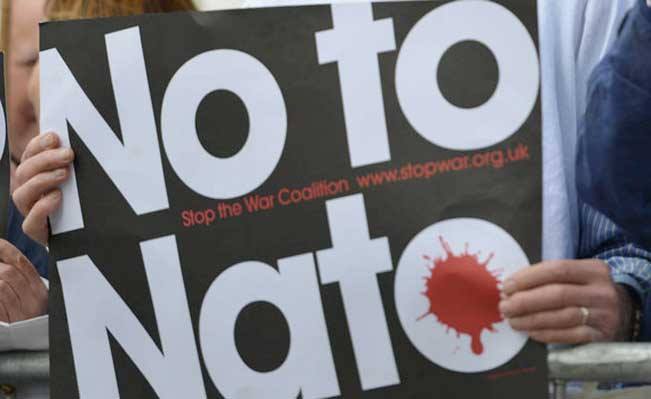
NATO recently touted its co-operation with the United Nations. This would seem to be a contradiction in terms, given that the UN was founded on the basis of defending international peace after World War II by upholding the sovereignty and equality of all nations and providing the mechanisms to work out differences based on diplomatic means. NATO, for its part, was founded for the express purpose of undermining the UN and imposing a Cold War ideology on international relations to advance Anglo-American imperialist aims.
On November 7, NATO's Military Committee hosted Lieutenant General Carlos Humberto Loitey, UN Military Adviser, for a briefing on its activities. Chairman of NATO's Military Committee, Air Chief Marshal Sir Stuart Peach, remarked, "Since 2008, our co-operation has grown significantly. In 2018, we signed a new joint declaration to further enhance our co-operation. Today, we work closely together on Afghanistan and Iraq. And NATO operations are carried out under UN Security Council mandates. NATO has also pledged support for UN peacekeeping operations. There is still more NATO and the UN can do together."
The UN Military Adviser referenced the involvement of NATO countries in current UN peacekeeping operations, saying that NATO members contribute more than 5,000 personnel to UN Peacekeeping Operations. He explained that NATO has also provided support to UN-sponsored operations, which includes logistical assistance to the African Union's UN-endorsed peacekeeping operations in Darfur, Sudan, and in Somalia; support for UN disaster-relief operations in Pakistan; and escorting merchant ships carrying World Food Programme humanitarian supplies off the coast of Somalia.

NATO states: "Practical co-operation between NATO and the UN extends beyond operations, including amongst other projects, the co-operation on tackling terrorist misuse of technology, countering improvised explosive devices, border security, providing assistance to NATO Allies in the identification and prosecution of foreign terrorist fighters, and strengthening capabilities to deal with threats posed by terrorist attacks with the use of chemical, biological, radiological or nuclear weapons."
Air Chief Marshal Peach concluded the November 7 meeting by saying, "This high-level visit is an opportunity to reconfirm the commitment between our organisations and discuss areas where we could enhance our practical co-operation while remaining complimentary and avoiding duplications. We could both benefit by working together on crisis assessment and management, information sharing, training and education, tackling corruption in the defence sector, promoting the role of women in peace and security, the protection of civilians, including children, in armed conflict, combating sexual and gender-based violence, and arms control and non-proliferation."
NATO's report on the November 7 meeting also refers to UN Security Council Resolutions as providing "the mandate for NATO's operations in the Western Balkans, Afghanistan and Libya. They have also provided the framework for NATO's training mission in Iraq." Rather than this indicating a field of co-operation, these activities show how the UN Security Council has been co-opted for warmongering aims to provide a legal veneer for unjust wars of aggression in all those countries.
Overall, this situation shows the growing danger posed by NATO, not only through its outright aggression, but also through its attempts to put a humanitarian face on its war preparations and to insinuate itself as a legitimate body that is qualified to intervene in social, political and economic affairs. It must not pass.
M K Bhadrakumar
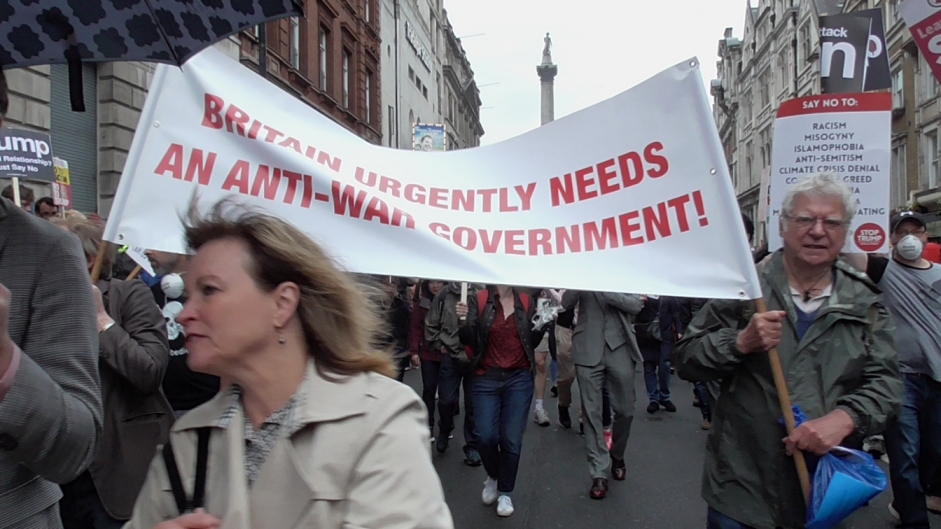
The December 3-4 summit of the North Atlantic Treaty Organisation (NATO) in London resembles a family reunion after the acrimony over the issue of military spending by America's European allies.
The trend is up for defence spending across European Allies and Canada. Over $100 billion is expected to be added to the member states' defence budgets by end-2020.
More importantly, the trend at the NATO foreign ministers' meeting at Brussels on November 19-20, in the run-up to the London summit, showed that despite growing differences within the alliance, member states closed ranks around three priority items in the US global agenda - escalation of the aggressive policy toward Russia, militarisation of space and countering China's rise.
NATO will follow Washington's lead to establish a space command by officially regarding space as "a new operational domain". According to NATO secretary-general Jens Stoltenberg, this decision "can allow NATO planners to make a request for allies to provide capabilities and services, such as satellite communications and data imagery".

Stoltenberg said, "Space is also essential to the alliance's deterrence and defence, including the ability to navigate, to gather intelligence, and to detect missile launches. Around 2,000 satellites orbit the Earth. And around half of them are owned by NATO countries."
Equally, Washington has been urging NATO to officially identify China's rise as a long-term challenge. According to media reports, the Brussels meeting acceded to the US demand and decided to officially begin military surveillance of China.
The US Secretary of State Mike Pompeo hit out at China after the Brussels meeting: "Finally, our alliance must address the current and potential long-term threat posed by the Chinese Communist Party. Seventy years ago, the founding nations of NATO came together for the cause of freedom and democracy. We cannot ignore the fundamental differences and beliefs in the - between our countries and those of the Chinese Communist Party."
So far so good. However, it remains to be seen if Washington's grand design to draw NATO into its "Indo-Pacific strategy" (read containment of China) will gain traction. Clearly, the US intends to have a say in the European allies' growing business and economic relations with China to delimit Chinese influence in Europe. The US campaign to block 5G technology from China met with rebuff from several European countries.
On the other hand, the European project has unravelled and the Franco-German axis that was its anchor sheet has become shaky. The rift between Paris and Berlin works to Washington's advantage but, paradoxically, also hobbles the western alliance system.
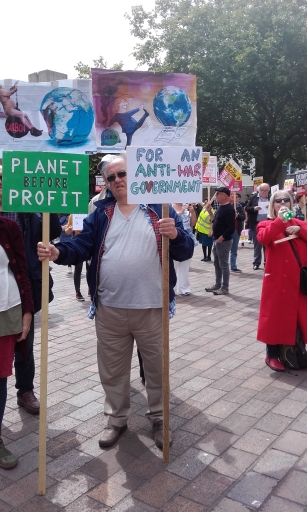
The French President Emmanuel Macron annoyed Germany by his recent calls for better relations with Russia "to prevent the world from going up in a conflagration"; his brutally frank remarks about NATO being "brain dead" and the US policy on Russia being "governmental, political and historical hysteria"; and his repeated emphasis on a European military policy independent of the US.
The congruence of interests between Berlin and Washington vis-à-vis Macron manifested itself in NATO's endorsement of the US-led escalation against Russia and China, with France rather isolated. However, this congruence will be put to the test very soon at the summit meeting of the Normandy format over Ukraine, which France is hosting on December 9, following NATO's London summit. France is helping Russia to negotiate a deal with Ukraine.
The recent phone calls between Russian President Vladimir Putin and his Ukrainian counterpart Volodymyr Zelensky underscored the growing interest in Moscow and Kiev at the leadership level to improve relations between the two countries.
In the final analysis, the Franco-German relations are of pivotal importance to not only Europe's strategic future but the western alliance system as such. If anyone was in doubt, the French veto in October means sudden death for the proposal on European Union accession of the Balkan state of North Macedonia, which NATO is inducting as its newest member. Berlin and Washington are livid, but a veto is a veto.
With NATO being set up by Washington for a confrontationist posture, Russia and China won't let their guard down. Addressing a meeting of the Russian Federation Security Council on November 22, Putin said, "There are many uncertainty factors; competition and rivalry are growing stronger and morphing into new forms. The leading countries are actively developing their offensive weapons, the so-called 'nuclear club' is receiving new members, as we all know. We are also seriously concerned about the NATO infrastructure approaching our borders, as well as the attempts to militarise outer space."
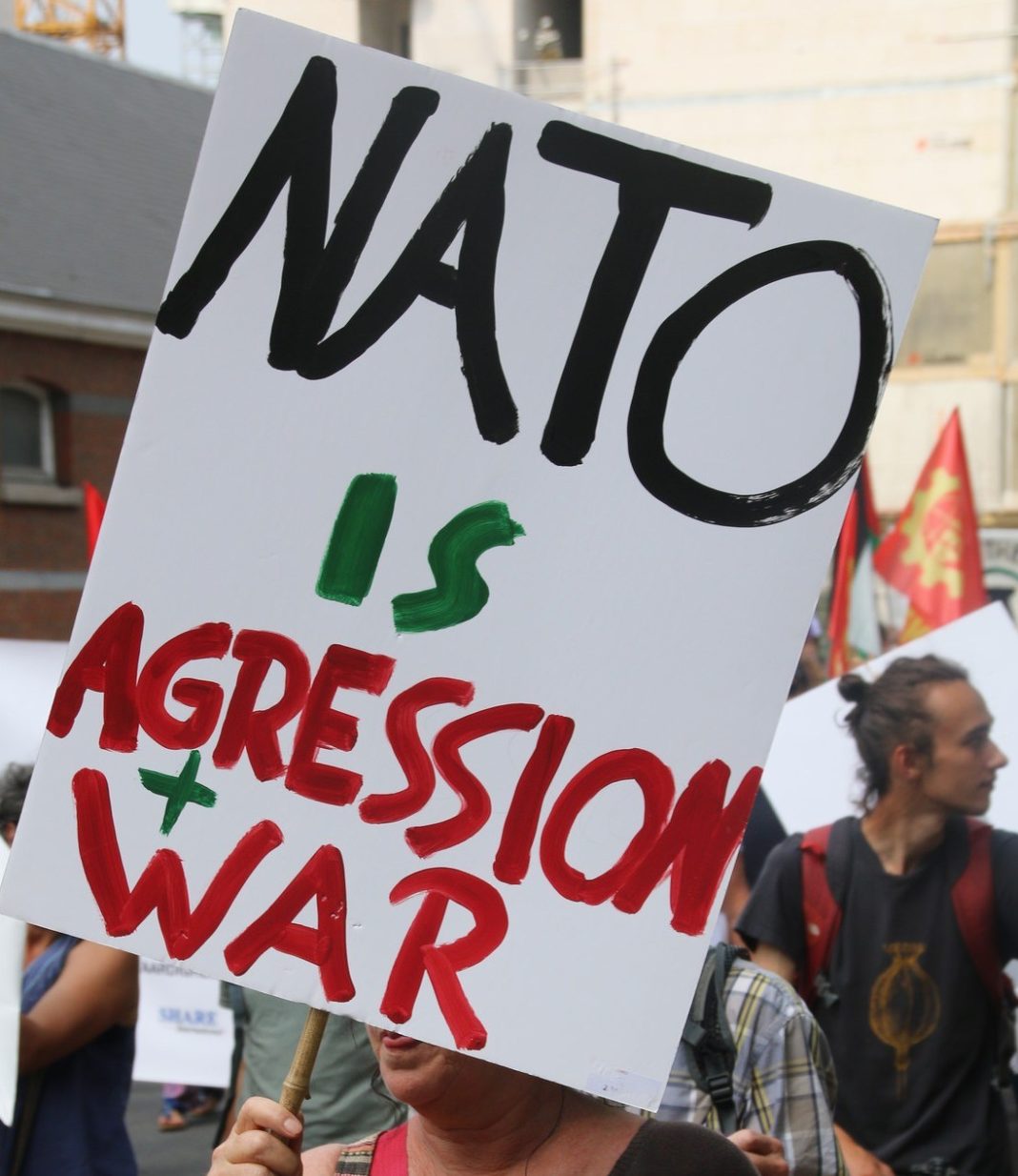
Putin stressed, "In these conditions, it is important to make adequate and accurate forecasts, analyse the possible changes in the global situation, and to use the forecasts and conclusions to develop our military potential."
The US-led military build-up against Russia and China will be on display in two big exercises next year code-named "Defender 2020 in Europe" and "Defender 2020 in the Pacific".
Significantly, only four days before Putin made the above remarks, Chinese President Xi Jinping told him at a meeting in Brasilia on the sidelines of the BRICS summit that "the ongoing complex and profound changes in the current international situation with rising instability and uncertainty urge China and Russia to establish closer strategic coordination to jointly uphold the basic norms governing international relations, oppose unilateralism, bullying and interference in other countries' affairs, safeguard the respective sovereignty and security, and create a fair and just international environment."
Putin responded by saying that "Russia and China have important consensus and common interests in maintaining global strategic security and stability. Under the current situation, the two sides should continue to maintain close strategic communication and firmly support each other in safeguarding sovereignty, security, and development rights."[1]
The Russian response is also visible on the ground. The share of modern weapons and equipment in the Russian Army and Navy has reached an impressive level of 70 per cent. The first pilot batch of next-generation T-14 Armata tanks will arrive for the Russian troops in late 2019 - early 2020.
On November 26, the Russian Defence Ministry stated that Moscow's breakthrough Avangard missile system with the hypersonic boost-glide vehicle will be deployed on combat duty with the Strategic Missile Force in December.
For the first time, the electronic warfare systems at Russia's military base in Tajikistan will be reinforced with the latest Pole-21 jamming station that can counter cruise missiles, drones and guided air bombs and precision weapon guidance systems. Moscow is guarding against the US and NATO presence in Afghanistan.
M K Bhadrakumar is a former Indian diplomat who writes mainly on Indian foreign policy and the affairs of the Middle East, Eurasia, Central Asia, South Asia and the Asia-Pacific.
Note
1. Chinese Ministry of Foreign Affairs.
(Indian Punchline, November 27, 2019)
Receive Workers'
Weekly E-mail Edition: It
is free to subscribe to the e-mail edition
We encourage all those who support the work of RCPB(ML) to also support it
financially:
Donate to
RCPB(ML)
Workers' Weekly is the weekly on
line newspaper of the
Revolutionary Communist Party of Britain (Marxist-Leninist)
Website:
http://www.rcpbml.org.uk
E-mail:
office@rcpbml.org.uk
170, Wandsworth Road, London, SW8 2LA.
Phone: 020 7627 0599: